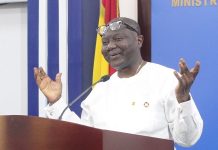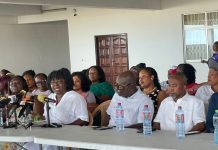Finance Minister Ken Ofori-Atta has said the ruling New Patriotic Party is good at fixing crises and promised that just as the Akufo-Addo government fixed the broken economy it inherited from the Mahama administration in 2017, so will it fix the current one ravaged by the COVID-19 pandemic and the Russia-Ukraine war under watch of the current administration.
In his 2022 mid-year review, Mr Ofori-Atta told parliament on Monday, 25 July that Ghana resorted to an IMF programme despite several assurances of not seeking help from the Bretton Wood institution because of the impact of the two international crises.
“Yes, I know this Government assured the nation of a Ghana beyond Aid and our plans and programmes for economic transformation have been designed to achieve just that, and indeed, I did say that Ghana would not embark on an IMF programme”, he noted.
Mr Ofori-Atta added: “We did not just say it. We also took measures towards the attainment of that objective including the passage of the Fiscal Responsibility Act and instituting a number of irreversibility measures, and also launching the Ghana CARES ‘Obaatan Pa’ programme for economic revitalisation and transformation”.
“Unfortunately, unprecedented global developments over the past two years, especially in these last six months, have really and truly disrupted our efforts. Governments across the world have had to change course to tackle the current crisis. Governments that less than a year ago were busily talking about energy transition and green and cleaner fuels have gone back to firing their coal plants. Governments that are known for low taxes are now raising taxes to tackle growing deficits. These are not ordinary times; not for Ghana, not for Africa, and certainly not for the whole world”, he told parliament.
He said: “Let us all acknowledge that the situation we are experiencing now is different. The global context we find ourselves in is the first of its magnitude in the Fourth Republic and even before that. It is, therefore, disheartening when people want to pretend that these developments are purely domestic”.
The minister said it was “trite knowledge that global developments including the impact of the COVID pandemic and the Russia-Ukraine war, have really undermined and disrupted most economies. Governments across the globe are facing strikes and demonstrations, as workers see their standards of living plummeting with prices of goods and services jumping to heights not seen in over two generations”.
He reported that an IMF staff team visited Accra from July 6 to 13, 2022, to assess the current economic situation and discuss the broad lines of our government’s Enhanced Domestic Programme that could be supported by the IMF.
“At the conclusion of the mission, the statement by the Team Lead correctly captured where we are and why we are where we are. He said: ‘Ghana is facing a challenging economic and social situation amid an increasingly difficult global environment. The fiscal and debt situation has severely worsened following the COVID-19 pandemic. At the same time, investors’ concerns have triggered credit rating downgrades, capital outflows, loss of external market access, and rising domestic borrowing costs. “In addition, the global economic shock caused by the war in Ukraine is hitting Ghana at a time when the country is still recovering from the Covid19 pandemic shock and with limited room for maneuver. These adverse developments have contributed to slowing economic growth, accumulation of unpaid bills, a large exchange rate depreciation, and a surge in inflation’”.
Despite the challenges, Mr Ofori-Atta said the Akufo-Addo government will fix things.
“Mr. Speaker, let me be quick to add that we are not wavering at all in our resolve to turn this country around. Ours is of a history of turning things around when the country is in crisis. When the NPP took over the reins of Government in 2017, we inherited a challenged economy under an IMF programme, which we successfully turned around and exited the programme in 27 months. If the economy was not on track, we would not have been given the all-clear”.
“That was why by April 2019, satisfied with the stability that we had brought to the economy and the policies that we were implementing to sustain growth, the IMF gave us the all-clear to exit the programme. Ghana’s growth rate had moved up from 3.7% in 2016, the lowest since 1992, to average 7% from 2017 to 2019. We had cut the rate of inflation down by 33% over the same period to 7.9% by the end of 2019, average lending rates had dropped from the 30s to 23.6% and still dropping. Our trade balance was up to $2.3 billion. The cedi remained relatively stable. Indeed, the amount of our total revenues that we used to service our debt had dropped from the 2018 spike of 73% to 58.9% by December 2019”.
“We were certainly not out of the woods yet, especially as revenues remained very low and we had been left with billions in arrears to pay, and more bills to pay from numerous contracts that the previous government had signed where we had to pay for electricity that we do not need. Yet, we still found money to fund our own ambitious promises to Ghanaians. We still found the money to bring back or invest more in vital social programmes that had been abandoned by the previous government”, he added.
“But, we also knew that our economy was still vulnerable to shocks. That was why we set out to introduce transformational policies that in the long term will put Ghana Beyond Aid. Key amongst them are the emphasis in education and vocational training, adding value to our economy through industrialisation and digitilisation, investing heavily in roads and railways, and rationalising the power sector”.
“Indeed, Ghana was touted globally as a success story. Investors were lining up in droves to buy our bonds, tourism had taken off-with over a million visitors touring Ghana in 2019 during the Year of Return. Then came the outbreak of the Pandemic, described in June 2020 by the IMF as ‘a crisis like never before’ but the Akufo-Addo government stood up to its responsibilities to the Ghanaian people”.
“I, the Finance Minister, who was widely described as tight-fisted, even by his own cabinet colleagues, had no choice but to do what the entire world was doing, which was to breach our own self-imposed deficit ceiling in order to save lives and protect livelihoods. We have demonstrated that we can transform this economy when we all come together and put our hearts and minds to it”.
“Mr. Speaker, just as we did in 2017 and 2020, the government is resolved to continue to provide the necessary leadership to turn the economy around. Let me assure you, on behalf of the President, that we will do it again within the next two and half years. To do this, we will proceed with great caution, thoughtfulness, creativity and grit, as the old adage says, we shall ‘hasten slowly’”.







































